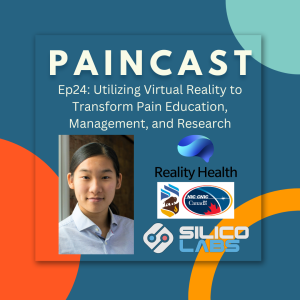
Saturday Mar 02, 2024
Ep24: Utilizing Virtual Reality to Transform Pain Education, Management, and Research
This episode showcases how Virtual Reality, VR in short, can be used to facilitate, advance, and even transform pain education, management, and research. You'll hear about a few different applications of VR in physiotherapy, including using VR as a tool for pain neuroscience education, VR for phantom limb pain, and VR for research. We also highlight the current literature related to these applications. Note that this episode is a limited demonstration of how VR can be used in different aspects of pain care and there are a lot more out there. Interested listeners can refer to the review papers I have cited in the episode description.
Timestamps:
(00:01:14) Reality Health: VR as a tool for Pain Neuroscience Education
(00:27:48) VR as a tool to prevent or manage Phantom Limb Pain
(00:43:52) SilicoLabs: VR as a versatile research and clinical tool
Relevant resources:
VR for pain overview:
- Ahmadpour, N., et al. (2019). Virtual Reality interventions for acute and chronic pain management. The international journal of biochemistry & cell biology, 114, 105568.
- Trost, Z., et al. (2021). Virtual reality approaches to pain: toward a state of the science. Pain, 162(2), 325-331.
VR for phantom limb pain:
- Limakatso, K., et al. (2020). The effectiveness of graded motor imagery for reducing phantom limb pain in amputees: a randomised controlled trial. Physiotherapy, 109, 65-74.
- Purushothaman, S., et al. (2023). Assessment of efficiency of mirror therapy in preventing phantom limb pain in patients undergoing below-knee amputation surgery—a randomized clinical trial. Journal of Anesthesia, 1-7.
- Cheung, J. C. W., et al. (2023). X-reality for phantom limb management for amputees: a systematic review and meta-analysis. Engineered Regeneration, 4(2), 134-151.
SilicoLabs: www.silicolabs.ca
Reality Health: https://reality.health/home/
- Skidmore, N., et al. (2024). Acceptability and Feasibility of Virtual Reality to Promote Health Literacy in Primary Care from the Health Professional’s view: A Qualitative Study. Patient Education and Counseling, 108179.
- Making pain education better: historical underpinnings & recent innovations – a discussion paper: https://www.petalcollaboration.org/uploads/1/4/4/1/144169171/moseley__ryan_petal_discussion_paper_making_pain_education_better_120923.pdf
- Video introduction to the platform: https://vimeo.com/915832727/e6572e2a5c?share=copy
Paincast is dedicated to bringing together researchers, clinicians, and students to discuss topics related to pain and physiotherapy. The primary purpose is to facilitate knowledge translation and critical thinking. Some episodes posit themselves as more educational than others, and some more opinionated than others. The listener is encouraged to listen critically. While there is an effort to incorporate research evidence, and the topics are always researched by the host, we recognize there is room for improvement and there is expertise in the community. As such, we invite constructive critique and that you inform us of any inadvertent errors, so that we may correct them. You may submit your feedback through this form: https://forms.gle/UFfbUHBh8uKwSKgS8
No comments yet. Be the first to say something!